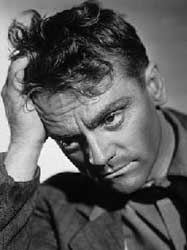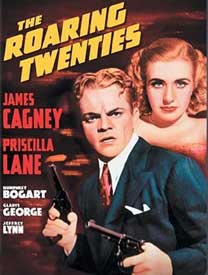A good egg (James Cagney in a defining performance) does his stint in the first world war. Following Armistice, he only wants to return to his pre-war grease monkey job & work on cars the rest of his life.
 Victimized by the unwanted increase of numbers in the labor force as soldiers return home, such men as Eddie tragically discovered their former lives closed off to them. Having no better recourse, Eddie becomes involved with the criminal underworld. He soon loses his naivete, & begins to rise in the world of urban illegal whiskey & speak-easies. Victimized by the unwanted increase of numbers in the labor force as soldiers return home, such men as Eddie tragically discovered their former lives closed off to them. Having no better recourse, Eddie becomes involved with the criminal underworld. He soon loses his naivete, & begins to rise in the world of urban illegal whiskey & speak-easies.
Humphrey Bogart in an early role nearly steals all his scenes as an irredemable bad guy. We first glimpse him as a doughboy & sniper, gleefully killing a German who is hardly more than a child, a minute before the end of the war, as Cagney's character looks on in sorrow.
But in the gangland world, Cagney will be only a little better than Bogart in the morality department, & both men are only seeking good lives for themselves, in a world that had disregarded the needs of its mustered doughboys, then handed them every possibility of success at crime under Prohibition.
Bad as he becomes, Cagney's charismatic Eddie never loses the viewer's sympathy. There is an inescapable desire to see him find redemption either for the sake of the girl who loves him, or perhaps through his continuing love of automobiles -- for his collection of booze-moving taxi cabs might at any moment be restored to legitimate use. But in Hollywood's morality, there are lines that heroes cross that cannot be redeemed except by utter sacrifice. Feeling for him as we do, that last Yakuza-like raid is both heroic & heartbreaking.
There are many dead-on perfect support roles & never a moment that is anything short of riveting. Deservedly heralded a masterpiece, the film is surprisingly realistic for all its Hollywoodisms, & in its own way brutal, chronicling as it does the life of an actual bootlegger of the age, Larry Fay whose biography (as recalled by newspaperman Mark Hellinger who provides voice-over narration), amended by or combined with the biography of Capone's rival Hymie Weiss. Warner Brothers, stinging from having been several times accused of romanticizing criminals, went for the harsh moral that if crime ever seems to pay, you just wait.
copyright © by Paghat the Ratgirl
|

 Victimized by the unwanted increase of numbers in the labor force as soldiers return home, such men as Eddie tragically discovered their former lives closed off to them. Having no better recourse, Eddie becomes involved with the criminal underworld. He soon loses his naivete, & begins to rise in the world of urban illegal whiskey & speak-easies.
Victimized by the unwanted increase of numbers in the labor force as soldiers return home, such men as Eddie tragically discovered their former lives closed off to them. Having no better recourse, Eddie becomes involved with the criminal underworld. He soon loses his naivete, & begins to rise in the world of urban illegal whiskey & speak-easies.